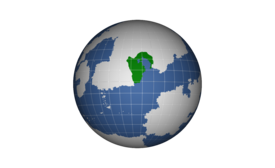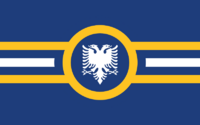Huvakia: Difference between revisions
No edit summary |
No edit summary |
||
| Line 65: | Line 65: | ||
==Etymology== | ==Etymology== | ||
"Huvakia" translates litterally in native Aegaean to "the Land of Peace". When | "Huvakia" translates litterally in native Aegaean to "the Land of Peace". When the historical states of Aegaeon, Gaeges, and Kottos decided to establish a permanent government amongst themselves it was decided that they would create an Empire dedicated as the land of Peace. | ||
==History== | ==History== | ||
===Formation=== | ===Formation=== | ||
Revision as of 02:53, 26 July 2020
The Federated States of The Empire of Huvakia Empire of Huvakia | |
|---|---|
| Motto: Audi, Vide, Tace | |
 | |
| Location | Southern Abos |
| Capital | Aegaeon |
| Largest city | Karsae |
| Official languages | Imperial English |
| Recognised national languages | Aegaean |
| Recognised regional languages | Karsean |
| Demonym(s) | Huvakian |
| Government | Constitutional Monarchy |
• Emperor | Aleksander Zaetsev |
• Prime Minister | Sarif Igorav |
| Legislature | The Federated Assembly |
| Sovereign Council | |
| Centum Assembly | |
| Tribal Unification | |
• Unification Day: October 19, 1697 | March 14, 1643 |
| Population | |
• 2020 estimate | 87 Million |
| GDP (nominal) | estimate |
• Total | 4.750 Trillion |
• Per capita | 251,475 |
| HDI | .89 very high |
| Currency | Imperial Credit |
| Date format | dd-mm-yyyy |
| Driving side | right |
| Calling code | (767) |
The Federated States of the Empire of Huvakia more commonly known as Huvakia, is an efficient nation comprised of 16 contiguous states surrounding the Sea of Aegaeon on the southern tip of Abos, North of the Depian Ocean. Huvakia is notable for its efficient economy, and near complete absence of violent crime among the population of 87 Million. The frighteningly efficient Huvakian economy, worth a remarkable 4.75 trillion Imperial Credits a year, is broadly diversified and led by the Oil & Natural Gas industry with significant contributions from the arms manufacturing, shipbuilding, and fishing industries. State-owned companies are common. Crime, especially youth-related, is totally unknown, thanks to the all-pervasive police force and progressive social policies in education and welfare. Huvakia's national animal is the Rottweiler, which frolics freely in the nation's many lush southern forests.
Etymology
"Huvakia" translates litterally in native Aegaean to "the Land of Peace". When the historical states of Aegaeon, Gaeges, and Kottos decided to establish a permanent government amongst themselves it was decided that they would create an Empire dedicated as the land of Peace.
History
Formation
Imperial Expansion
Industria Revolution
Discovery of Oil
Geography
Climate
Northern Huvakia has a hot desert climate (Koppen BWh). Summers in the northern city-state of Aegaeon are hot, prolonged, windy, and humid, with an average high around 40 °C (104 °F) and overnight lows around 30 °C (86 °F) in the hottest month, August. Most days are sunny throughout the year. Winters are comparatively cool, though mild to warm, with an average high of 24 °C (75 °F) and overnight lows of 14 °C (57 °F) in January, the coolest month. Precipitation, however, has been increasing in the last few decades, with accumulated rain reaching 110.7 mm (4.36 in) per year.[65] Dubai summers are also known for the very high humidity level, which can make it very uncomfortable for many with exceptionally high dew points in summer. Heat index values can reach over 60 °C (140 °F) at the height of summer.[66] The highest recorded temperature in Aegaeon is 48.8 °C (119.8 °F). Southern Huvakia is largely characterised by a humid subtropical climate (Köppen Cwa). Summer is hot and humid, with occasional showers and thunderstorms and warm air from the southwest. Typhoons occur most often then, sometimes resulting in floods or landslides. Winters are mild and usually sunny at the beginning, becoming cloudy towards February; an occasional cold front brings strong, cooling winds from the north. The most temperate seasons are spring and autumn, which is generally sunny and dry. When there is snowfall, which is rare, it is usually at high elevations. In southern Huvkia the city-state of Karsae averages 1,709 hours of sunshine per year.
Environment
Politics and Government
Military
The Emperor serves as supreme commander and chief of the armed forces which is administered by the Huvakian Ministry of Defense. The military is divided into 3 branches: the Army, Navy, and Air Force. All of these branches serve professionally, and have no other occupation. All citizens of Huvakia upon turning 18 are required by law to serve in a branch of the armed forces for no less than four years. This service can be deferred until the completion of collegiate education at which point admission takes place as an officer.
Foreign Relations
Economy
The Empire is the second largest importer of goods on Abos and third-largest exporter, though exports per capita are relatively low. In 2010, the total Imperial trade deficit was $635 billion. West Phoenicia, Eldrado, and Horikoru are among its top trading partners. In 2018, automobiles,hemp products, and information technology were the largest import commodity, while crude oil and military equipment are the country's largest export.
Energy
The Imperial energy market is about 29,000 terawatt hours per year. Energy consumption per capita is 7.8 tons (7076 kg) of oil equivalent per year, the 10th-highest rate in the world. In 2018, 30% of this energy came from petroleum, 15% from coal, and 10% from natural gas. The remainder was supplied by nuclear power and renewable energy sources.The Empire is the world's second largest exporter of petroleum and crude oil, controlling 26% of global oil reserves. Prometheus Imperial Power is the largest energy company in Huvakia.
Infrastructure
Issues that affect water supply in the Empire include droughts in the West, water scarcity, pollution, a backlog of investment, concerns about the affordability of water for the poorest, and a rapidly retiring workforce. Increased variability and intensity of rainfall as a result of climate change is expected to produce both more severe droughts and flooding, with potentially serious consequences for water supply and for pollution from combined sewer overflows.
Transport
Personal transportation is dominated by automobiles, which operate on a network of 2 million miles of public roads, including one of the world's longest highway systems at 57,000 mi (91,700 km). The world's second-largest automobile market, the Empire has the highest rate of per-capita vehicle ownership in the world, with 765 vehicles per 1,000 Imperials . The average adult (accounting for all drivers and non-drivers) spends 55 minutes driving every day, traveling 29 miles (47 km). In 2017, there were 255,009,283 motor vehicles—including cars, vans, buses, freight, and other trucks, but excluding motorcycles and other two-wheelers. Mass transit accounts for 19% of total work trips. Transport of goods and passengers by rail is extensive. Bicycle usage for work commutes is minimal. The civil airline industry is predominantly owned by the government though some foreign airlines are allowed to operate. All major airports are publicly owned. Of the world's 50 busiest passenger airports, 16 are in the Empire.


